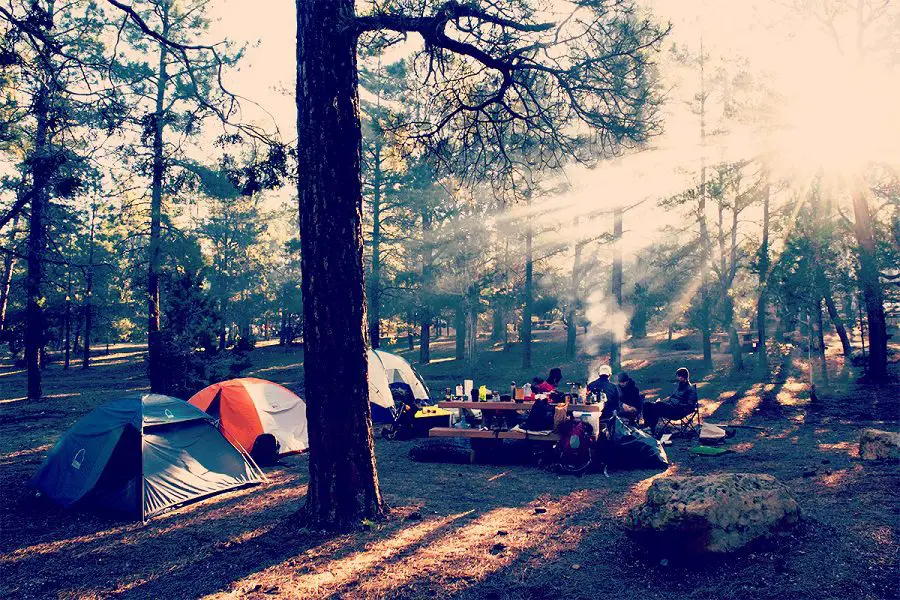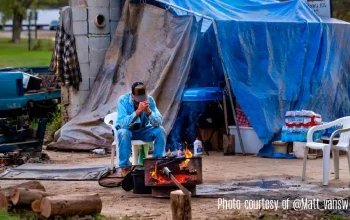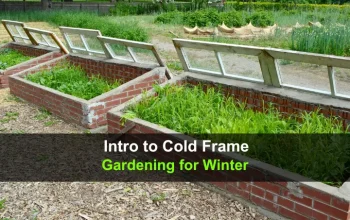SHTFPreparedness may collect a share of sales or other compensation from the links on this page.
Camping trips should be an exciting adventure and a wonderful way to get away from the stress of daily life.
Most of us fondly remember going camping with family as kids, yet when it came to our first camping trip as adults, we felt overwhelmed, to say the least.
Trying to figure out what gear we needed, what meals to make, and how to find the right campground felt like a struggle at first.
15 First Time Camping Tips for Beginners
Fortunately, planning ahead can help you avoid most beginner mistakes. Here are our top 15 tips to help your first few camping trips go smoothly:
1. Write Out a Detailed Camping Essentials Checklist

A pearl of wisdom for every camper, regardless of experience, is to put together a camping gear checklist.
Nothing puts a damper on the mood more than forgetting your shower towel or realizing you didn’t pack enough lights. Forgetting something more serious, like your tent poles, could bring an end to your trip before it even begins.
While each camper’s essentials list will be unique, starting with a standard checklist of basic gear will be helpful. If you’re camping with children, a family-oriented checklist will help you remember the extra gear your kids will need.
You can easily add extra gear you might need to a basic printable. It can be helpful to have family members or friends you’re camping with read over the list to make sure you haven’t forgotten any key times.
2. Test All of Your Gear Before You Leave
Once you know what gear you need, it’s a wise idea to go through a practice run in your backyard or even your living room.
You want to know how all of your equipment works and be able to use it without much trouble. Your tent is the most important piece of equipment, so you should definitely know how to set it up correctly.
Also check your bedding, like sleeping bags and camping cots. Setting up and staking your tent improperly may damage the tent itself, cause it to collapse, or blow over in high winds.
Before playing with the poles, read your tent’s instructions. Instructions vary by model. Putting up larger tents is easier with a helper, but you can do it yourself.
Other equipment to test out includes your camp stove, water treatment system, camping hammock setup, and any other similar items. You don’t want to lose your light because you forgot to check the batteries on your camping lantern.
3. Make Sure Your Tent is Big Enough for Everyone
New campers are probably unaware of how deceptive tent capacity can be.
When you’re shopping for a tent, you’ll see some type of capacity in the model name, such as 4-person or 4P. You’d assume this means the tent would be perfect for you and three others, but this isn’t quite true.
Tent capacity should be considered the maximum number of occupants, rather than the ideal. A standard four-person tent is much more suitable for two adult campers with some gear than for four adults.
For new and casual campers, it’s generally advisable to choose a tent that can accommodate two extra occupants.
If you’re camping with young children, you may be able to get away with one more occupant, unless you’re camping with a bulky crib.
4. Double-Check the Forecast and Plan for Worse
We know firsthand how unexpected rain can really make a camping trip feel like a downer.
Once you know what day(s) you’d like to camp on, always check with a trustworthy weather forecast provider to see what you should expect.
Because you’re a new camper, chances are high that you’ll be camping during the summer. That means that rain is likely to be the only weather event that might affect your trip.
Even if the forecast doesn’t indicate a chance of rain, you should always be ready. At a minimum, you should ensure that your tent has a water-resistant surface treatment and that each person has a rain jacket.
If there is a fairly good chance of rain, then bringing along a tarp to string up will come in handy so you won’t be stuck in your tent.
5. Don’t Make Your Meal Plan Too Complicated
Another mistake we’re guilty of is getting overly ambitious with my meal plan while camping.
Camping trips are usually a social event, and with that comes gathering around the campfire to chow down on some tasty food together.
If you’re already a bit of a home chef, it can be really tempting to want to try out some extravagant recipes. Stop worrying about complicated or ingredient-heavy meals at first.
Look for straightforward recipes with fewer ingredients to worry about. As you get more experience cooking on the campfire, you can experiment with more elaborate meals or try out Dutch oven recipes.
6. Practice Reversing and Parking Your RV
We highly recommend camping with RVs, trailers, or even just large trucks to practice parking and reversing before they reach their campsite.
You might be able to drive through town fine or park in a spacious RV-designed paved parking spot, but maneuvering at a campsite is trickier.
As someone who has first-hand experience nearly getting a camping trailer stuck, we want to be sure to save you the same embarrassment.
Unless you have the time to get a lesson from an RV driving instructor, YouTube will be your best friend when it comes to virtual driving tips.
Once you get the basics down, be sure you’re especially comfortable with parking and reversing into a campsite.
7. Brush Up on Campfire Safety Before You Leave
The smell of a campfire is instant nostalgia, and there’s little doubt that new campers will be looking forward to building one.
But there are right and wrong ways to go about building one. No one can overstate the importance of campfire safety, and many campgrounds have rules.
You must also consider local fire conditions, regardless of whether you’re staying at a campground or not. Even if the campground doesn’t have a warning posted, don’t risk it if the local conditions cause high fire danger.
We’ve found that building campfires can actually be quite fun. Aside from the basic fire, there are a number of different styles to try out if you’re up for experimenting.
8. Stay Close to Home on Your First Trip
Planning a camping trip can make anyone feel wanderlust, but for your first trip or two, it’s a beneficial idea to stay close to home.
This is mainly for safety and convenience reasons. If an emergency occurs, you can pack up and drive home by staying at a local campground.
This could be due to an unexpected change in weather or a discovery that your tent isn’t waterproof. Or maybe those dinner hotdogs didn’t agree with you.
9. Don’t Forget Your Shower Shoes and Quarters
It might seem like a random tip to include, but it’s one that many seasoned campers have learned the hard way.
Always include shower shoes and some quarters in your essentials list, so you don’t forget them! As a new camper, you’re probably staying at a campground that has some amenities, like showers.
A hot shower after a dirty day is great, but not if you don’t have any quarters. Not all, but the majority of campground showers will require quarters for payment.
More modern sites may allow for a card, but these are pretty rare. As for the shower shoes, these can be super simple plastic flip-flops or sandals.
The purpose of these devices is to provide protection for your feet while showering. Just like a locker room floor, campground showers are a breeding ground for fungus and bacteria that you definitely don’t want to be walking on.
10. Choose a Campsite with Mobile Phone Coverage
A camping trip is a wonderful way to unplug and take a break from your phone, but new campers should try to choose a site within their service coverage.
This serves two purposes: ensuring you can make phone calls and allowing you to easily view maps. In the event of an emergency, being able to make a phone call can be a literal lifesaver.
Having a working phone is also handy for checking local maps if you choose not to use a handheld GPS.
Having mobile service can also be beneficial for new campers who want access to YouTube videos on cool camping tricks, cooking, fishing tips, and more.
11. Get to Your Campsite Earlier in the Day
You don’t have to arrive at your campsite early, but it’s ideal.
By arriving early, you’ll have a better selection of campsites, be able to get your campsite set up without rushing, and have the day for exploring.
It’s helpful to lay out the land and find the campground amenities and trails. You can also go for a hike with your group to any notable landmarks surrounding the park.
If work or other responsibilities mean you simply can’t get to the campgrounds early, don’t worry. Following the other tips, setting up at night gets easier.
12. Review the Campground Rules Before Settling In
Every campground will have a different set of rules to follow. Before settling into camp, it’s a beneficial idea to stop by and familiarize yourself with the visitor’s office.
This is especially important for any rules regarding campfires, garbage disposal, off-limit zones, and any safety rules pertaining to the area (i.e., wildlife).
Knowing what rules you need to follow can save you from a visit from a park ranger.
By not following the posted rules, you may only get a warning, but serious offenses, like an open fire during a ban, can lead to an expensive fine.
Be sure to also follow the basic etiquette rules for all campgrounds. Be courteous to others, don’t litter, and try to keep the noise down after dark.
13. Use Books or Apps for IDing Local Flora and Fauna
Camping should be a positive experience, regardless of whether you’re going to relax or hike around and have fun.
If you’re new to camping and the outdoors in general, I highly recommend you use your trip as a way to learn about your region.
Identifying wildlife, plants, and trees is valuable for anyone planning to camp regularly and gives you insight into the environment around you.
You can identify flora and fauna by carrying field guides or downloading apps on your phone. Some of these apps even allow you to take a photo of the object to help you identify it more accurately.
14. Put Together a Bored Box, Especially for Kids
Even though camping is far from boring when you do it right, there are times on longer trips when you might find yourself wanting something to do.
This is where a “bored box” or “bored bag” comes in handy. A bored box or bag is a container filled with items to keep you entertained.
These can be books, board games, card games, a craft set, coloring books, campfire song lyrics, or any other fun item or game.
A boring box is a wonderful idea for adults and kids alike, but it’s basically a must-have for camping families.
15. Save Your Solo Adventure After You Have Experience
Solo camping is very rewarding, but it’s best to wait until you have some camping skills first.
Going on group camping trips will help you when it comes to setting up camp, gathering firewood, and cooking.
Another thing to consider is that camping with others will make you feel safer and provide you with company. People always surround us, whether in person or through social media.
Being away from nature and not having others around can be pretty daunting. If you don’t have anyone to camp with, consider looking for local outdoor social groups.
Wrap-Up
Our best piece of advice for new campers is to remember that camping should be a fun, relaxing activity, even if those first couple trips have some hitches.
Maintain a positive attitude, adhere to these tips, and embrace the unexpected!
What do you think of these tips? Do you have any advice for new campers to share?



